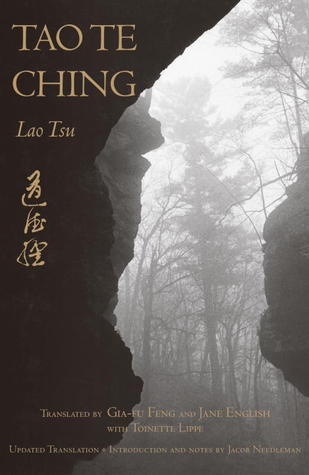What do you think?
Rate this book


107 pages, Paperback
First published January 1, 401
"رغم ان الميثولوجيا الصينية حافلة بالآلهة من شتى الأشكال والأنواع والإختصاصات، إلا ان هذه الآلهة لم تكن في حقيقتها إلا أسلافاً اسطوريين رفعهم الخيال الشعبي الى مراتب عليا وقدسهم واقام لهم المعابد. وتظهر السير الأسطورية لهؤلاء الأسلاف كيف ابتدأ أمرهم كرجال صالحين على الأرض وكبف تم تأليههم وعبادتهم فيما بعد."
"اما المصدر الحقيقي لقدرة الآلهة الصينية فهو مفهوم مجرد عن الألوهة يتمثل في قوة السماء التي يدعونها تي-يين... ويرى كونفوشيوس ان ارادة السماء انما تفعل من خلال عناية متضمنة في صلب نظام الطبيعة لا من خارجها. ويقابل هذا النظام الطبيعي، عنده، نظام آخر يسود على المستوى الإنساني في المجتمع هو القانون الأخلاقي"
"ان الفارق بين مفهوم التاو ومفهوم الإله الخالق، هو ان الإله انتج العالم عن طريق الخلق الإرادي بينما انتج التاو العالم عن طريق الخلق غير الإرادي. الإله خلق العالم بواسطة الفعل اما التاو فبواسطة اللافعل... الخلق الإرادي يتم التشكيل من الخارج نحو الداخل... اما الخلق غير الإرادي فإن التشكيل يتم من الداخل نحو الخارج وبشكل تلقائي."
ان التاو ليس سيداً للكون يمارس سلطانه عليه من موضع مستقل ومفارق، وكأنه والكون هويتان مستقلتان، بل هو عين النظام الداخلي للطبيعة الحر من اية ضرورة خارجية. من هنا فإنه لا يتطلب من الكائنات عرفاناً ولا يدعي امتلاكاً ولا ينسب لنفسه فضلاً."
"ان روح الوادي تعني جوهر الفراغ الذي يمكن تحقيقه من خلال السكون وإفراغ الذهن من كل انشغال بالذات الفردية، حتى اذا وصل الإنسان الى حالة الإفراغ التام امتلأ بالعدم الخلاق الذي هو جوهر التاو."
"اكثر سطوعاً من اي نور، اكثر عتمة من اي ظلام. جوهر النور وجوهر الظلام. عندما يلتقي اقصى النور واقصى الظلام في واحد، ذلك هو الفراغ العظيم والعدم الخلاق الذي ينشأ عنه كل شيء... ليس له بداية او نهاية، وأبده عين ازله. اذا قلنا انه الصورة التي لا صورة لها، والشكل الذي لا شكل له، وقفنا امام جدار الصمت وتساقطت الكلمات"
"من يسلك وفق قواعد أخلاقية مقررة سلفاً انما يسلك بشكل لا أخلاقي، ومن يحب جاره تطبيقاً لتعاليم متعارف عليها لا يعرف شيئاً عن الحب، ومن يرعى اولاده خوفاً من القانون ومن تقولات الناس لا يعرف شيئاً عن الأبوة"
"اذا عاد الجميع الى طبيعتهم الأصلية غير المصقولة، تلمس كل واحد في صميمه ذلك المنبع الحقيقي للمحبة، وسلك بشكل تلقائي فأحب دون ان يسمي ذلك حباً وتعاطف دون ان يسمي ذلك تعاطفاً ورفق بالحيوان دون ان يسمي ذلك رفقاً واطاع الوالدين دون ان يسمي ذلك طاعة. لقد تخلص من زينة الأخلاق ليسلكها."
أفضل الحكام من شابه الظل عند رعيته
يليه الحاكم الذي يحبون ويمدحون
يليه الحاكم الذي يخافون ويرهبون
يليه الحاكم الذي يك��هون ويحتقرون
"ان السلاح أداة شؤم يبغضها الناس، لذا فرجل الدولة التاوي لا يلجأ لإستخدامها. فإذا كان لا بد من شن الحرب وإشهار السلاح، فإن على رجل التاو ان يخوض حربه في حياد. والحياد هنا هو الحياد النفسي الذي يخلو من الإنغماس العاطفي. التاوي يحارب وهو في حالة صفاء الذهن والنفس، ... كما انه يتفادى ما تثيره الحرب من مشاعر العنف والرغبة في القتل والتدمير."
"لا مجد في الإنتصار، لأنه لا يتحقق الا على اشلاء الوف القتلى. وتمجيد الإنتصار يعني تمجيد القتل واعطائه مشروعية وقيمة."
"عندما تظهر الشرائع المفروضة من قبل أية سلطة، فإن في ذلك مؤشراً على وجود خلل في المجتمع، لأن المجتمع السليم المتماشي مع سبيل التاو لا يتطلب شريعة أخلاقية تنظم علاقات افراده. الشريعة هي قشرة خارجية للإيمان والإخلاص، ورجل الفضيلة الحقة لايأبه لها بل يصدر في سلوكه عن منبع الأخلاق الأصلي."
"من يسلك وفق قواعد أخلاقية مقررة سلفاً انما يسلك بشكل لا أخلاقي، ومن يحب جاره تطبيقاً لتعاليم متعارف عليها لا يعرف شيئاً عن الحب، ومن يرعى اولاده خوفاً من القانون ومن تقولات الناس لا يعرف شيئاً عن الأبوة"
"ان فن الحياة ينبغي الا يقوم على طلب اليانغ (الإيجاب) واستبعاد الين (السلب)، بل الحفاظ على حالة من التوازن بين القطبين، لأنه لا قيام لأحدهما إلا بوجود الآخر."
"عاش معلم الزن ريوكان في كوخ متواضع عند سفح الجبل. في احدى الأمسيات دخل الكوخ لص فوجد المكان خالياً، وبينما هو خارج امسك به ريوكان وقال له: لقد اتعبت نفسك في الوصول الى هذا المكان النائي وانه ليعز علي ان اتركك تذهب خالي الوفاض. اليك ثوبي هدية. اخذ اللص الثوب وولى هارباً. جلس ريوكان عارياً تقريباً قبالة النافذة يرقب القمر الذي توسطها، ثم هز رأسه بأسف قائلاً: كم وددت لو اعطيته هذا المشهد الجميل"
VI
The Spirit of the valley never dies
This is called the mysterious female.
The gateway of the mysterious female
Is called the route of heaven on earth.
Dimly visible, it seems as if it were there,
Yet use will never drain it.

XXIX
Whoever takes the empire and wishes to do anything to it
I see will have no respite. The Empire is a sacred vessel and
nothing should be done to it. Whoever does anything to it
will ruin it; whoever lays hold of it will lose it.
Hence some things lead and some follow;
Some breath gently and some breathe hard;
Some are strong and some are weak;
Some destroy and some are destroyed.
Therefore the sage avoids excess, extravagance and arrogance.
They come to be and he claims no possession of them,
He works without holding on,
Accomplishes without claiming merit.
Because he does not claim merit,
His merit does not go away.
Things arise and she lets them come;
things disappear and she lets them go.
She has but doesn't possess,
acts but doesn't expect.
زندگي را همان گونه كه هست جشن بگيريد
وقتي درك كنيد که هيچ كاستي و نقصي وجود ندارد
كل دنيا متعلق به شما خواهد بود
